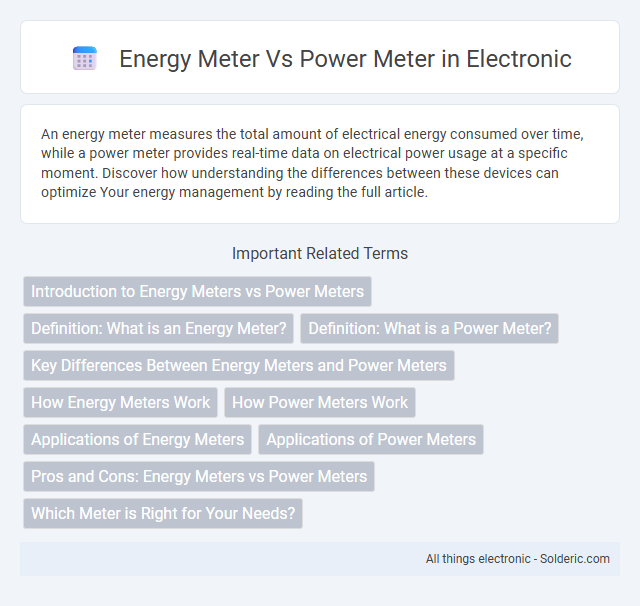An energy meter measures the total amount of electrical energy consumed over time, while a power meter provides real-time data on electrical power usage at a specific moment. Discover how understanding the differences between these devices can optimize Your energy management by reading the full article.
Comparison Table
| Feature | Energy Meter | Power Meter |
|---|---|---|
| Definition | Measures total electrical energy consumed over time (kWh) | Measures instantaneous electrical power at a given moment (kW) |
| Primary Use | Billing and monitoring energy consumption | Monitoring and analyzing real-time power usage |
| Measurement Units | Kilowatt-hour (kWh) | Kilowatt (kW) or Watts (W) |
| Data Type | Cumulative energy consumed | Instantaneous power values |
| Application | Residential, commercial energy billing | Industrial power quality analysis, load management |
| Typical Accuracy | +-1-2% | +-0.5-1% |
| Device Examples | Smart energy meter, electromechanical meter | Power analyzer, clamp meter |
Introduction to Energy Meters vs Power Meters
Energy meters measure the total electrical energy consumed over time, expressed in kilowatt-hours (kWh), and are essential for billing and monitoring usage. Power meters measure instantaneous electrical power in watts (W), providing real-time data on energy consumption or generation. Accurate differentiation between energy and power meters is crucial for applications in energy management, efficiency analysis, and system performance evaluation.
Definition: What is an Energy Meter?
An energy meter measures the total electrical energy consumed by a residence, business, or electrical device over time, usually expressed in kilowatt-hours (kWh). It records cumulative energy usage, allowing utility companies and consumers to track and bill for electricity consumption accurately. Unlike power meters, energy meters focus on the integral of power consumption rather than instantaneous power levels.
Definition: What is a Power Meter?
A power meter is an advanced device designed to measure the real-time electrical power consumption in watts, volts, and amps, providing instantaneous data on energy usage. Unlike an energy meter, which tracks cumulative energy consumed over time in kilowatt-hours (kWh), a power meter focuses on the immediate power load and performance of electrical systems. Understanding your power meter readings helps optimize efficiency and manage energy costs effectively.
Key Differences Between Energy Meters and Power Meters
Energy meters measure the total amount of electrical energy consumed over time, typically expressed in kilowatt-hours (kWh), providing cumulative data crucial for billing and usage tracking. Power meters, on the other hand, measure real-time electrical power, expressed in watts (W) or kilowatts (kW), indicating instantaneous consumption or demand. The fundamental difference lies in energy meters offering aggregated consumption data, whereas power meters deliver immediate power usage readings essential for monitoring and managing electrical loads.
How Energy Meters Work
Energy meters measure the total electrical energy consumed by recording the flow of electric current and voltage over time, converting this data into kilowatt-hours (kWh). Power meters, on the other hand, measure real-time electrical power output or consumption in watts, providing instantaneous power usage information. Understanding how energy meters work can help you track cumulative electricity usage for accurate billing and energy management.
How Power Meters Work
Power meters measure the real-time power consumption by calculating voltage and current simultaneously to determine instantaneous wattage. These devices use sensors like current transformers (CTs) and voltage sensors to capture electrical signals, which are then processed to provide accurate power readings. By continuously monitoring these electrical parameters, power meters help optimize energy usage and improve system efficiency.
Applications of Energy Meters
Energy meters are widely used in residential, commercial, and industrial settings to measure cumulative electrical energy consumption over time, enabling accurate billing and energy management. These devices help monitor electricity usage patterns, support demand-side management programs, and facilitate energy audits to improve efficiency. Unlike power meters, which provide real-time power measurements, energy meters focus on total energy consumed, making them essential for utility companies and consumers aiming to track long-term energy usage.
Applications of Power Meters
Power meters are essential in applications requiring precise measurement of electrical power consumption and quality, including in industrial automation, renewable energy systems, and electrical grid monitoring. They enable real-time data collection and analysis for optimizing energy efficiency, load management, and fault detection in commercial and residential buildings. Power meters support advanced diagnostics in power plants and facilitate compliance with energy regulations through accurate power factor and harmonic distortion measurements.
Pros and Cons: Energy Meters vs Power Meters
Energy meters measure total electrical energy consumption over time, making them ideal for monitoring overall usage and managing utility costs, but they lack real-time power data. Power meters provide immediate readings of electrical power (in watts), enabling detailed analysis of power quality and instantaneous load, though they do not track cumulative energy consumption. Your choice depends on whether you need long-term energy tracking or real-time power monitoring for efficiency improvements.
Which Meter is Right for Your Needs?
Choosing between an energy meter and a power meter depends on your specific monitoring requirements and goals. Energy meters measure total consumption over time, ideal for tracking electricity usage and managing billing, while power meters provide real-time power metrics such as voltage, current, and power factor, essential for analyzing load performance and system efficiency. Evaluating whether you need cumulative energy data or instantaneous power quality insights will help you determine which meter suits your needs best.
energy meter vs power meter Infographic

 solderic.com
solderic.com